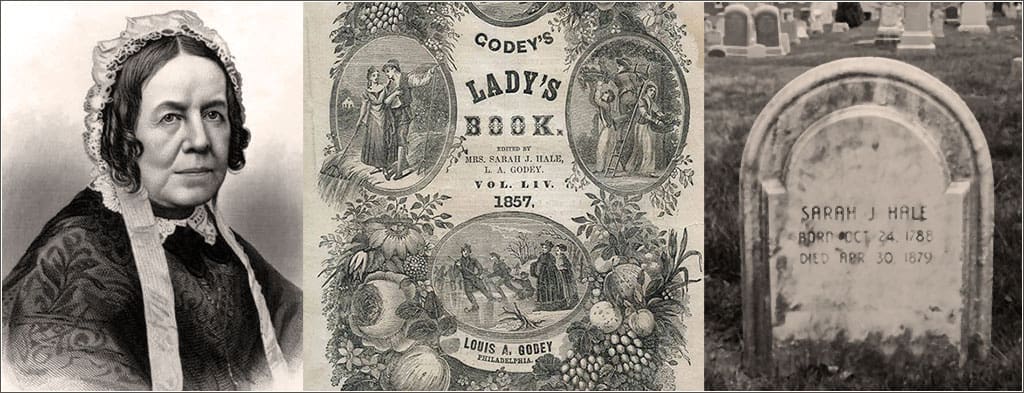
Happy Thanksgiving! Did you know the holiday we celebrate tomorrow with parades, turkey, full bellies and football wouldn’t exist if not for this Wednesday’s Woman? She is Sarah Josepha Buell Hale (1788-1879), a.k.a. the Godmother of Thanksgiving.
A voracious reader home schooled by her mother and an older brother who shared his college texts with her, she found herself widowed at 34 with five children, little money and few prospects. A small millinery shop paid the bills, but Hale’s real passion was books. So she decided to try her hand at one of the few vocations deemed suitable for women: writing.
In 1823, with the support of her late husband’s masonic brothers, she published her first book of poems. Collections of short stories and cookbooks followed, as did a first novel, Northwood, a Tale of New England, in 1827.

Ten years later she became editor of Godey’s Lady’s Book, one of America’s most influential magazines, billed as “the first magazine edited by a woman for women.” It was a position she held for 40 years. But Northwood gave America its first detailed description of an idyllic Thanksgiving — pristine damask tablecloth, roasted turkey, aromatic stuffing, cranberries, plum pudding, pumpkin pie, and a sideboard ranged with decanters and bottles of wine, cider and homemade ginger beer.
Godey’s editorials
Hale wrote editorials in Godey’s about Thanksgiving and lobbied state and federal officials to create a fixed national day of thanks on the last Thursday of November in hopes it might help ease tensions over slavery brewing between northern and southern states. By the time Civil War erupted in 1861, 30 states and US Territories had Thanksgiving celebrations on their books.
Sarah Hale is considered the most important American woman to have engaged in literary enterprise in the mid-nineteenth century.
Amid hostilities, the holiday continued in the Union and the Confederacy. Jefferson Davis issued Thanksgiving Day proclamations after Southern victories while President Lincoln called for a day of thanks after Union victories at Fort Donelson, Fort Henry, Shiloh and Gettysburg in 1863 — clearly not what Hale had in mind.
Lincoln’s proclamation
After Gettysburg, she wrote Lincoln and Secretary of State Seward, again urging them to declare Thanksgiving a permanent American institution. Within a week of receiving her Sept. 28 letter, Seward drafted Lincoln’s official proclamation, fixing America’s observation on the last Thursday in November in a gesture designed to help bind the country’s wounds.
But never one to rest on her laurels, Hale launched another crusade in 1871 to have a national Thanksgiving Day proclaimed not just by the President, but by a formal act of Congress. Seventy years later, the Senate and House passed a bill establishing Thanksgiving on the fourth Thursday of November.
On November 26, 1941, President Franklin D. Roosevelt signed it into law — but not before changing the date from the last Thursday to the fourth Thursday to provide more shopping days before Christmas in hopes of bolstering retail sales as America struggled to pull itself out of the Great Depression.
Sarah Josepha Buell Hale retired from Godey’s Lady’s Book in December of 1877 at the age of 89. She died at her Philadelphia home on Locust Street two years later and was buried in a simple grave in Laurel Hill Cemetery. Today she is considered the most important American woman to have engaged in literary enterprise in the mid-nineteenth century.
